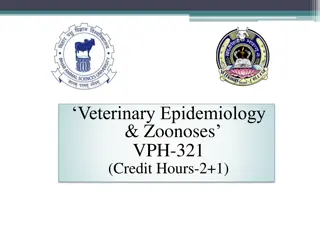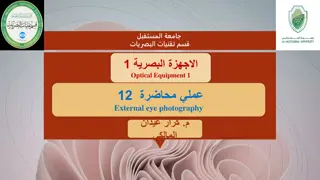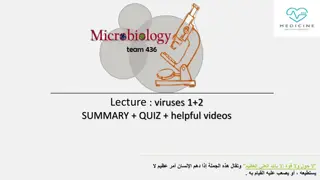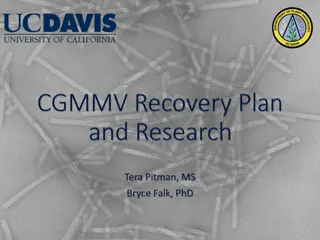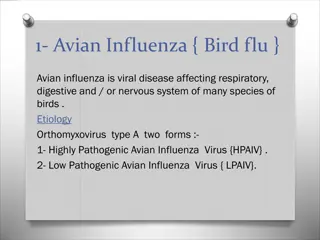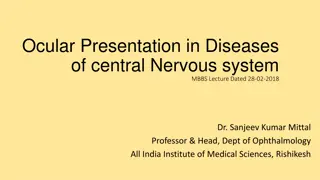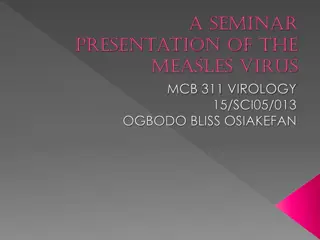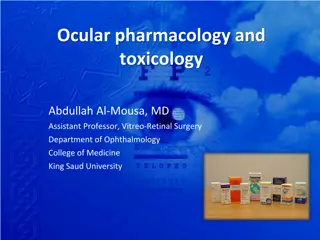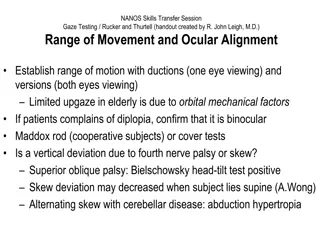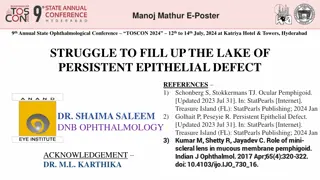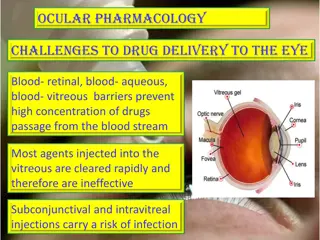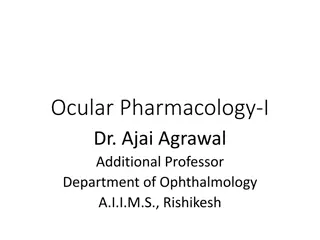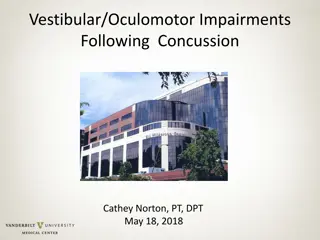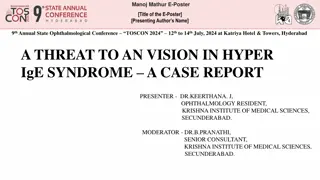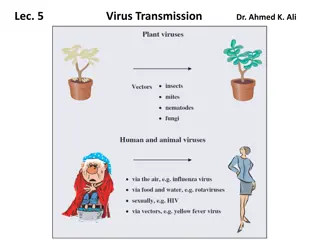Advances in Ocular Proton Therapy Treatment Planning
Explore the intricate world of ocular proton therapy treatment planning with Dr. Linda Mortimer, PhD. Discover the fundamental elements of an ocular treatment plan, main goals of treatment planning, an overview of dedicated ocular Treatment Planning Systems (TPS), planning workflows, choice of TPS,
1 views • 12 slides
Global Ocular Implants Market-Projected to Reach $23.43 Billion by 2031
Ocular Implants Market Size, Share, Forecast, & Trends Analysis by Type (Scleral, Stock, Orbital, Intraocular, Retinal, Corneal) Material (Silicon, Hydroxyapatite) Application (Prosthesis, Ocuplasty, Glaucoma Surgery) End User \u2013 Global Forecast to 2031\n
1 views • 4 slides
Create a Virus Using Notepad: Dangerous Notepad Virus Codes
Learn how to create a virus using Notepad by following various dangerous virus codes such as creating fake Windows errors, stopping someone's internet access, and crashing a PC forever. Be cautious with these codes as they can cause serious harm to a computer system.
0 views • 10 slides
Understanding Yellow Vein Mosaic Virus of Bhindi
Yellow Vein Mosaic Virus of Bhindi, also known as Okra Yellow Vein Mosaic, is a viral disease caused by the Begomovirus, affecting okra plants. The disease manifests through symptoms like vein-clearing and vein-chlorosis of leaves, leading to yellow network patterns on the leaves and stunted, malfor
0 views • 14 slides
Bloodborne Pathogens Training Overview for Ground Team Members
Understanding bloodborne pathogens is crucial for ground team members to protect themselves and others. This training covers what bloodborne pathogens are, focusing on Hepatitis B Virus (HBV) and Human Immunodeficiency Virus (HIV), their symptoms, transmission risks, and prevention methods. HBV fact
0 views • 29 slides
Importance of Screening and Separation in Marburg Virus Disease Control
Early identification and separation of suspected Marburg virus disease patients play a crucial role in preventing the spread of the disease within healthcare settings. Screening and setting up specific areas for identification and isolation are essential steps to protect healthcare workers, patients
1 views • 15 slides
Understanding Rabies: A Comprehensive Overview
Rabies is an acute fatal disease affecting humans and warm-blooded animals, characterized by abnormal behavior, nervous disturbances, excessive salivation, and respiratory paralysis. It claims around 55,000 human lives globally, with efforts in rabies control showing marginal success. The etiology o
0 views • 22 slides
Mẹ bị sốt virus ảnh hưởng gì cho thai nhi không
M\u1eb9 b\u1ea7u b\u1ecb s\u1ed1t virus c\u00f3 \u1ea3nh h\u01b0\u1edfng \u0111\u1ebfn thai nhi kh\u00f4ng? Mang thai l\u00e0 giai \u0111o\u1ea1n nh\u1ea1y c\u1ea3m v\u00e0 m\u1eb9 d\u1ec5 b\u1ecb nhi\u1ec5m virus, vi khu\u1ea9n g\u00e2y s\u1ed1t.
0 views • 3 slides
Understanding OSHA Bloodborne Pathogens Training and Hepatitis B Virus
Covering the basics of OSHA Bloodborne Pathogens Standard, this training material provides essential information on bloodborne pathogens, including Hepatitis B Virus (HBV). It emphasizes the importance of training for individuals with occupational exposure, outlining crucial topics such as Hepatitis
2 views • 56 slides
Overview of Virology Methods: Cultivation, Isolation, Purification
Various methods are employed in virology, including virus cultivation in different cells, virus isolation, and virus purification through centrifugation. Structural investigations, virion component-based techniques, and virus infectivity-based techniques are also common in virology research. Underst
0 views • 15 slides
Understanding Ocular Herpes Virus: Pathogenesis, Mechanism of Action, and Clinical Features
Herpes viruses are common human pathogens causing both asymptomatic infection and active disease. Ocular herpes, typically caused by HSV-1, presents with symptoms like pain, photophobia, and blurred vision. Factors like UV rays, trauma, and stress can trigger reactivation. Recurrent infections often
2 views • 33 slides
Pathology of Pox Virus in Wild Animals by Dr. Deepak Kumar
Pox viruses can affect wild animals, with Monkeypox emerging as a significant zoonotic virus in Central and West Africa. The disease shows similarities to smallpox but is less severe. Pox lesions are characteristic signs of infection, and outbreaks have been documented in regions with a history of s
0 views • 16 slides
Advancements in Ophthalmic External Photography
Ophthalmic external photography, particularly external ocular photography (EOP), plays a vital role in ophthalmology practice by capturing images of the eye, ocular adnexa, and facial structures. It aids in documenting lesions, nerve anomalies, surgical outcomes, and disease progression. Digital pho
0 views • 17 slides
Global Ocular Prosthesis Market
\"The Global Ocular Prosthesis Market Size is Anticipated to Exceed USD 2.9 Billion by 2033, Growing at a CAGR of 8.35% from 2023 to 2033. \n\n\"\n
1 views • 5 slides
Understanding Feco-Oral Diseases and Diarrhea Transmission
Feco-oral diseases, primarily transmitted through the fecal-oral route, remain a significant global health concern, especially affecting children under 5 and the elderly. Diarrhea, characterized by WHO as three or more watery stools in 24 hours, poses a substantial burden, with infectious agents cau
0 views • 46 slides
Rapid Ocular Sideline Concussion Diagnostics Project Proposal
Proposed project aims to provide tools for trainers in sports to automate and expedite concussion testing using ocular nerve testing. The focus is on developing an automated eyeset to quickly assess players on the sideline, potentially returning them to the game faster. The project also aims to inte
0 views • 7 slides
Viral Infections of the Respiratory System Lecture Summary & Quiz
This lecture covers viral infections of the respiratory system, focusing on Avian flu, Influenza Virus, Respiratory Syncytial Virus, Human metapneumovirus, Parainfluenza viruses, Measles, and Mumps virus. It includes information on the structure, symptoms, lab diagnosis, treatment, and prevention of
0 views • 11 slides
Understanding Zika Virus: Risks and Precautions
Zika virus is a mosquito-borne infection that can lead to birth defects and neurologic disorders. It spreads through mosquito bites and can also be transmitted from mother to child during pregnancy or through sexual contact. The virus is prevalent in South and Central America, the Caribbean, and is
0 views • 17 slides
Understanding Cucumber Green Mottle Mosaic Virus: Disease Cycle and Testing Methods
This content provides detailed information on Cucumber Green Mottle Mosaic Virus, including its nucleotide genome, disease cycle, testing methods like DAS-ELISA and RT-PCR, seed testing protocols, bioassay for virus confirmation, and symptom expression in host plants. The data covers aspects such as
0 views • 14 slides
Understanding Cutaneous Manifestations of HIV and AIDS
Human Immunodeficiency Virus (HIV) is a lentivirus that infects CD4 T lymphocytes, leading to Acquired Immunodeficiency Syndrome (AIDS). Cutaneous manifestations of HIV/AIDS vary depending on the stage of infection and CD4 T cell counts. Early signs include exanthem, oral hairy leukoplakia, candidia
0 views • 17 slides
Ocular Implants Market
Ocular implant market projected to hit $23.43 billion by 2031, growing at 6.1% annually. Fueled by rising demand for vision restoration treatments.\n\n
1 views • 9 slides
Understanding Viruses and Bacteria: A Biology Presentation by Mandie Lynn Walls
Explore the world of viruses and bacteria through this engaging biology presentation put together by Mandie Lynn Walls. Learn about the structure of viruses, different types of viruses like T4 Bacteriophage and Herpes Virus, the distinction between viruses and bacteria such as E. coli, vaccination m
0 views • 39 slides
Understanding Avian Influenza: Symptoms, Diagnosis, and Prevention
Avian influenza, or bird flu, is a viral disease affecting birds' respiratory, digestive, and nervous systems. It presents in two forms - Highly Pathogenic Avian Influenza Virus (HPAIV) and Low Pathogenic Avian Influenza Virus (LPAIV). The virus has two important surface antigens, Hemagglutinin (H)
0 views • 7 slides
Overview of Bovine Viral Diarrhea Virus (BVDV)
Bovine Viral Diarrhea Virus (BVDV) is an RNA virus belonging to the Pestivirus genus in the Flaviviridae family. It is classified into BVDV-1 and BVDV-2 genotypes with distinct biotypes. BVDV is a significant infectious disease in the livestock industry worldwide, with high prevalence and clinical c
0 views • 14 slides
Ocular to Imaginary Deixis in Greek Epigram
The seminar held at University College London on 16th May 2018 explored the transition from ocular to imaginary deixis in Greek epigrams. It delved into the significance of visual elements in ancient artifacts and inscriptions, shedding light on the evolution of contextual meanings within Greek art
0 views • 8 slides
Clinical Study of Dry Eye Disease Among Computer Users
Dry eye disease (DED) is a common ocular condition, particularly among computer users due to factors like decreased blink rate, environmental conditions, and visual display terminal use. This clinical study by Dr. Ankam Sai Akhil aims to assess the prevalence, causative factors, awareness, and risk
0 views • 6 slides
Ocular Presentation in Diseases of Central Nervous System - MBBS Lecture
Ophthalmologist Dr. Sanjeev Kumar Mittal from AIIMS Rishikesh discusses the ocular manifestations of intracranial lesions, emphasizing the importance of early diagnosis by ophthalmologists. Symptoms include headaches, vision changes, seizures, and more, while signs may include visual field defects,
0 views • 32 slides
Understanding Measles Virus: A Comprehensive Seminar Presentation
The measles virus, also known as rubeola or morbilli virus, is a highly contagious infection that primarily affects the respiratory system. This presentation delves into the classification, characteristics, and pathogenesis of the virus, shedding light on its structure, transmission, and impact on p
0 views • 24 slides
Understanding Ocular Pharmacology: General Principles and Drug Delivery
The study of ocular pharmacology involves understanding general pharmacological principles, pharmacodynamics, and pharmacokinetics. Drugs can be delivered to ocular tissue locally via eye drops, ointments, injections, or systemically through oral or intravenous routes. Factors such as drug concentra
0 views • 58 slides
Understanding Anti-Anti-Virus Techniques and Retroviruses
Explore the world of anti-anti-virus techniques including Retroviruses and Entry Point Obfuscation. Learn about the methods used by viruses to evade detection and damage anti-virus software. Discover how Retroviruses like Ganda virus operate stealthily to hinder anti-virus programs. Delve into strat
0 views • 24 slides
Techniques in Ocular Examination for Gaze and Visual Fixation
Explore various techniques for assessing ocular alignment, range of motion, and eye movement in patients through sessions focusing on gaze testing, visual fixation, saccades, and smooth pursuit. Learn how to identify abnormalities such as nystagmus, saccadic movements, and pursuit asymmetries to aid
0 views • 6 slides
Managing Ocular Cicatricial Pemphigoid: A Case Study from TOSCON 2024
A 64-year-old female presented with ocular symptoms, diagnosed with Ocular Cicatricial Pemphigoid at the 9th Annual State Ophthalmological Conference (TOSCON) 2024. Treatment included topical lubricants, anti-inflammatory agents, immunomodulators, and mini-scleral lens fitting. The patient showed sy
0 views • 6 slides
Challenges and Strategies in Ocular Drug Delivery
Ocular pharmacology faces challenges in effective drug delivery due to blood-retinal, blood-aqueous, and blood-vitreous barriers that impede high drug concentrations in the eye. Various routes of administration, including topical and local injections, are employed to overcome these barriers. Pharmac
0 views • 27 slides
Understanding Ocular Pharmacology - An Overview by Dr. Ajai Agrawal
Explore the intricate world of ocular pharmacology with Dr. Ajai Agrawal, an Additional Professor at A.I.I.M.S., Rishikesh. The learning objectives cover pharmacokinetics, pharmacodynamics, and various routes of drug administration in ocular treatments. Delve into the anatomy of the eye, tear film c
0 views • 51 slides
Overview of Crimean-Congo Hemorrhagic Fever Virus
Crimean-Congo Hemorrhagic Fever (CCHF) virus is an RNA virus belonging to the genus Nairovirus, causing a zoonotic disease with high mortality rates in humans. The virus is transmitted mainly by ticks, particularly the Hyalomma species, and can result in severe illness in both domestic and wild anim
0 views • 17 slides
Understanding Vestibular and Oculomotor Impairments Post-Concussion
This presentation discusses common vestibular and oculomotor impairments following a concussion, highlighting the importance of the Vestibular/Ocular Motor Screening Assessment in identifying and monitoring concussions. It covers evaluation techniques for the vestibular system, interventions for ocu
0 views • 69 slides
Understanding Chicken Pox: A Seminar on the Medical Importance of Viruses
Chicken pox, caused by the Varicella-zoster virus, is a contagious infection primarily affecting children. This seminar presentation delves into the classification, route of infection, symptoms, and treatment of this viral disease common in Africa. The Varicella-zoster virus, a member of the herpes
0 views • 17 slides
Understanding Ocular Melanoma: Symptoms, Diagnosis, and Treatment
Ocular melanoma is a type of cancer that affects the eye, specifically the iris, ciliary body, or choroid. This type of melanoma originates from pigment cells within the uvea of the eye. Symptoms may include blurred vision, flashes of light, shadows, and more. Diagnosis typically involves an eye exa
0 views • 20 slides
Vision Threat in Hyper IgE Syndrome: A Case Report
Hyper IgE Syndrome (HIES) is a rare primary immunodeficiency characterized by elevated IgE levels and recurrent infections. Ocular involvement in HIES is uncommon, with reported cases of various eye conditions such as conjunctivitis and retinal detachment. A 17-year-old male with HIES presented with
0 views • 6 slides
Understanding Virus Transmission via Vectors in Hosts
Viruses must be propagated and transmitted to new hosts for survival. They can be spread via vectors like arthropods, which acquire and transmit viruses during feeding. This transmission can occur quickly through the vector's mouthparts or more slowly via circulation in the vector's body. Plant viru
0 views • 14 slides
